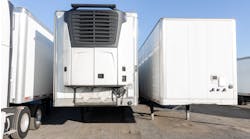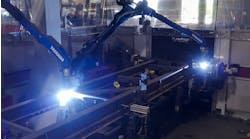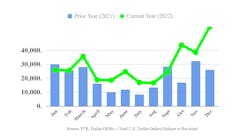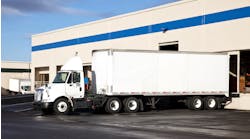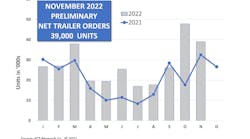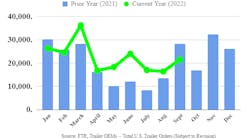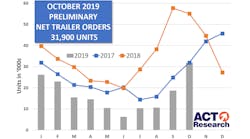Preliminary estimates from ACT Research and FTR Intel indicate trailer orders increased 71% from September to October.
ACT says trailer manufacturers booked 31,900 orders in October, marking the second straight month of sequential growth greater than 70%. Volume remained 42% below last year’s pace but slightly above the same month in 2017.
Year-to-date, net trailer orders are off 52% from their torrid 2018 pace.
Before accounting for cancellations, new orders of 37,500 trailers were up 73% from September, but 34% below last year. ACT’s final volume will be available later in November.
“After a lackluster summer, order volume has now surged for two straight months, and is tracking more in line with historic seasonal order patterns,” said Frank Maly, director of commercial vehicle transportation analysis and research at ACT. “October order strength was highly concentrated in dry vans, where orders were more than two times that of September.
“A counterpoint to the net order surge was continuing elevated cancellations, occurring in both dry vans and reefers. Since we are approaching year-end, it is likely that cancellations are due to a combination of several factors. Some placeholder orders are likely being cleared from the system and it is also likely some production is being shifted into early 2020, either at OEM or fleet request.”
FTR said October order activity, which it pegged at 31,800 units, was the highest since November 2018, pointing to a “vibrant” start for the 2020 trailer ordering seasons.
Still, orders were down 42% year-over-year from 2018’s near-record volume. Trailer orders for the past 12 months now total 241,000 units, according to FTR.
The high October order totals were achieved despite elevated cancellations, as a few OEMs continue to clean up their 2019 backlogs. October production is expected to be down moderately on a per-day basis due to seasonal factors, with backlogs climbing slightly for the first time in ten months.
“This is great news for the trailer market,” said Don Ake, FTR vice president of commercial vehicles. “Several large dry van fleets placed requirement orders for 2020, showing they have confidence in the freight markets going into next year. Dry van orders were strong despite a lull in freight growth. There still is plenty of replacement demand present and fleets continue to need more dry vans to move products quickly to and between warehouses due to increased online sales.
“The vocation trailer markets, such as flatbeds and dumps, are still struggling as the industrial sectors of the economy weaken. Refrigerated van orders are expected to increase soon. The higher October orders suggest the market will be decent in 2020, although down significantly from the expected record production volume of 2019.
“The trailer market is slowing, but a significant downturn is not imminent.”


